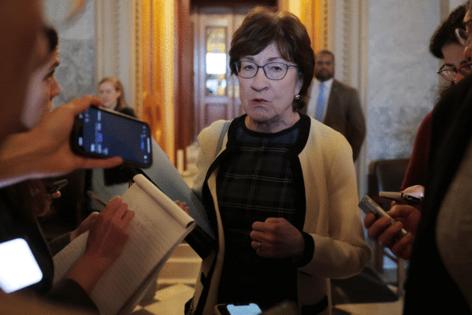Sen. Collins urges reversal of Trump's biomedical research clawbacks
Published in News & Features
WASHINGTON — Sen. Susan Collins has an urgent warning about the state of biomedical research in the United States, saying the country could lose its edge if it continues on its current track.
At the Senate Appropriations Committee’s first full hearing this Congress Wednesday, Collins, the Maine Republican who chairs the panel, called on the Trump administration to reverse course on cutbacks. She cited the administration’s cap on indirect research costs, the canceling of grants and the mass firing of employees across the Health and Human Services Department.
“These actions put our leadership in biomedical innovation at real risk and must be reversed,” she said.
Her message is the starkest opposition yet from a Republican lawmaker to the Trump administration’s health care agenda. Collins, who also serves on the Health, Education, Labor and Pensions Committee, voted to confirm HHS Secretary Robert F. Kennedy Jr.
“Stability is a key aspect of the American formula, because it allows scientists to focus their work, knowing that they will have the support they need to pursue and test their ideas from start to finish,” she said at the hearing, which focused on keeping America competitive in biomedical research.
Sudip Parikh, the CEO of the American Association for the Advancement of Science, testified at the hearing that if funding for fiscal 2026 resembles White House “passback” budget, the country will have lost the competition for innovation with China.
“I want to be really clear, we’re no longer in a race with China on bio,” if HHS funds are cut by the proposed amounts, he said. “We would have lost that place.”
The passback proposal cuts billions of dollars from HHS, including funds for the National Institutes of Health. It would request $80.4 billion in discretionary funds for the department, down from over $125 billion this fiscal year.
Sen. John Kennedy, R-La., supported the capping of indirect costs, asking why universities can’t get by with a 15% cap if the figure is even lower for grants given by philanthropic organizations like the Gates and the Robert Wood Johnson foundations.
Parikh said comparing the two types of grants was like comparing “apples to oranges,” because those organizations don’t classify costs in the same way.
“What I’ve heard, the implication is that anybody who is against asking hard questions about overhead and spending is against biomedical research,” Kennedy said.
“I don’t agree with that,” Parikh responded.
Sen. Katie Britt, R-Ala., focused a line of questioning on the importance of federal funding for research. She asked Barry Paul Sleckman, director of the University of Alabama at Birmingham O’Neal Comprehensive Cancer Center, to speak about the rise of cancer incidence in recent years.
Britt has previously voiced concerns about the cuts to indirect research costs, but acknowledged that the government should spend research money judiciously.
Sleckman said more should be done to prevent cancer, but the top risk factor for the disease is age. He said that life expectancy has on the whole increased as treatments have improved for other chronic conditions like cardiovascular and pulmonary diseases.
“They’re now living to much older age, where they increase the risk of getting cancer,” he said.
©2025 CQ-Roll Call, Inc., All Rights Reserved. Visit cqrollcall.com. Distributed by Tribune Content Agency, LLC.







Comments